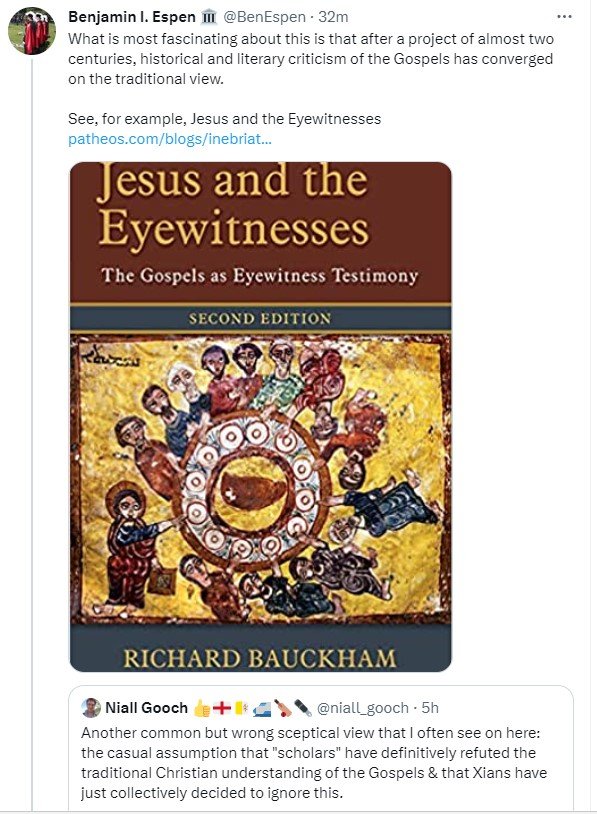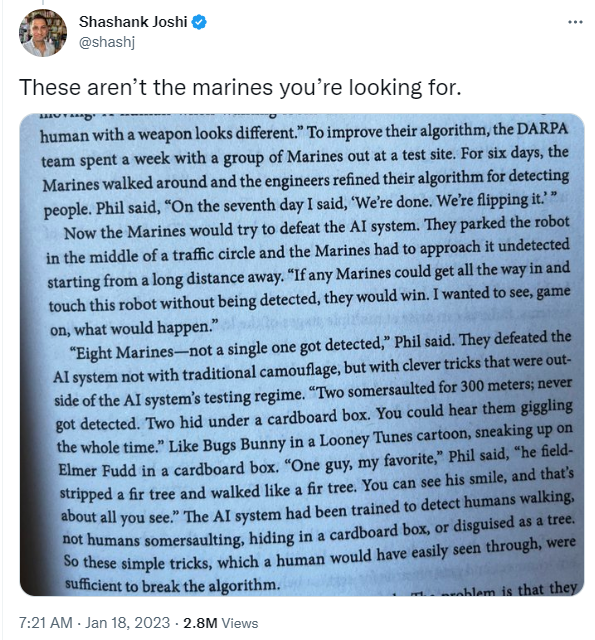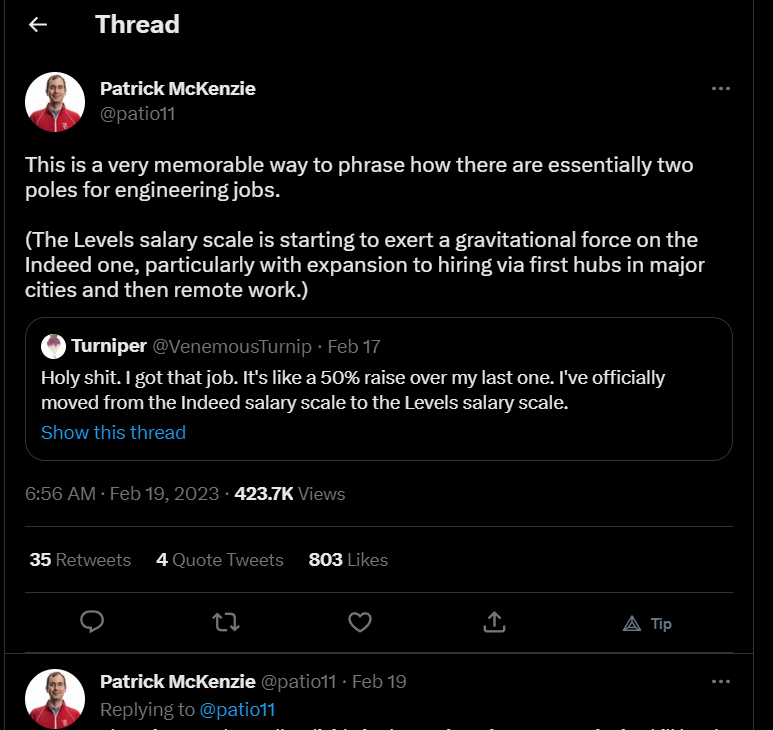Linkfest 2023-02-25: The Gospel Truth
On Twitter this morning I commented on how historical and literary criticism of the Gospels has slowly come around to the traditional interpretation, although I suspect many people haven’t quite caught on to that yet.

In particular, I love this from PEG’s book review of Jesus and the Eyewitnesses:
Another piece of evidence is statistical: thanks to grave inscriptions and administrative records, we know a lot of things about what names people had in ancient Palestine, and it turns out that the statistical distribution of names in the Gospels matches up with the statistical distribution of names in Palestine overall, which wouldn’t be the case if, as many Biblical scholars have assumed, names attached to specific stories in the Gospel were basically made up out of thin air to add color to anonymous tradition stories; to the contrary, it makes very credible the suggestion that those names belong to actual existing, specific people, who are the sources for the stories attached to them (as some have noted, there’s about five zillion “Marys” in the Gospels, who are sometimes hard to tell apart, which would be awful if you were making up a story, but matches up if they are the actual people in a country where Mary was a very common girl’s name).
Literary methods, archeological methods, and statistical methods all converging on a common conclusion is pretty strong evidence.


With Both Hands: Holy Roman America
In a similar way, I can’t stop thinking about how Colin Woodward’s layer-cake thesis of the settling of America was so spectacularly confirmed by genetic evidence.
Ars Technica: Man beats machine at Go in human victory over AI
This is absolutely hilarious. Machines can be very effective at implementing algorithms in an optimal way, but lack human understanding. So the way you beat a machine is nothing like the way you beat a human.



The Long View: The Stopping Problem
Lots of people freaking out about AI on Twitter right now, but if you really want to be scared, read this short story by John J. Reilly.
The Stopping Problem
I would never have thought that the human race would face extinction quite like this. We are going out with neither a bang nor a whimper, but in a state of discontented absentmindedness.
The Lunar Society: The myth of the myth of the well read person
This is an interesting contrast to my point up above about how methods of inquiry can eventually converge on the truth if consistently applied over time.
Despite midwittery about “theories” and science’s provisional status, a lot of the real value of science is in crystallized conclusions that have enormous predictive power. Most of this stuff is also old, possibly boring, and absolutely not cutting edge
So you don’t have to be scouring through the newest papers on Arxiv in order to know the most important things. A dozen or so textbooks even from a few decades ago contain about 80% of legible scientific knowledge.
This is a story that repeats in many fields. If you’re interested in economics, then you don’t have to memorize the prices of goods and the rates of growth throughout history. Instead, read books that try to explain a broad range of phenomena with a single theory, like the Baumol cost effect or the efficient market hypothesis or nominal GDP targeting.
However, unlike Dwarkesh, I advocate that you very much do need to acquire a large set of ready facts about the world. Learning and really understanding good theory can enable you to do amazing things, but without a very large store of correct information about the world, you will be less able to comprehend where theories don’t map to reality, or even when theories will be useful at all.

John J. Reilly said this about organizing facts by using theory in his out-of-print book The Perennial Apocalypse:
Cognitive structures, such as gestalts, are more relevant to you the more thinking you do, so their effect is greatest among people with extensive educations who think about things for a living. I have already mentioned how I find Spengler’s theory of history particularly attractive, simply because it constitutes a convenient mental filing cabinet for storing historical information which I come across. I admit this tool also has drawbacks. As in any bureaucracy, the task of keeping the files in your head in good order can become more important than dealing with the real world.
I really enjoyed this reflection on the thought of Joseph Ratzinger, Pope Benedict XVI.
A second element of Ratzinger’s thought is romanticism – and specifically German romanticism. As described by Theo Danouk, romanticism means understanding a nation as an “organic outgrowth” of a people who “share historical and social-cultural practices” including language, religion, and art. Culture is the term that captures all this, like Strauss’s definition of politeia as regime. The term refers to “simultaneously the form of life of a society, its style of life, its moral taste, form of society, form of government, spirit of laws.”
So while Ratzinger argues that Enlightenment principles are “generally valid,” he also maintains that such principles were gestated exclusively in Christian contexts, and they cannot “be reached in the same manner in every historical context.” This is why he opposed Turkey joining the EU – as “seeking to plant on Muslim soil the secular attitude that has matured in the Christian world of Europe.”
Ratzinger’s romanticism is mainly expressed through his writings on cultures, which he saw as highly distinct reflections of different contexts. As the 19th-century theologian Johann Adam Möhler puts it:
“Each nation is endowed with a peculiar character, stamped on the deepest, most hidden parts of its being, which distinguishes it from all other nations, and manifests its peculiarity in public and domestic life, in art and science; in short, in every relation.”
Many of Ratzinger’s contemporaries saw culture as a merely accidental set of local ‘quirks’ which can be arbitrarily adopted by whomever – not as something profoundly formative on the “deepest, most hidden parts” of our being. But Ratzinger applies this same principle to Catholicism itself. Catholicism is universal, yes, but also a culture. Taking the faith to the ends of the earth, Ratzinger claimed, meant habituating others to this culture, not just reimagining it in other cultural forms. Different cultures might have “moral tastes” or approaches to “art and science” which simply can’t correlate with the faith.
Letters from Hyperborea: On the Sword
This was intriguing enough to make me want to pick up the sword.
I firmly believe that everyone who seriously trains in martial arts should study the sword.
Many do not agree with this opinion, especially the “tactical self-defense” types. Their objections are valid; this is the twenty-first century, and nobody carries a falchion or wakizashi for protection anymore. But the sword is important not because of its actual use in “combat”, nor for its direct carryover to other aspects of “realistic” fighting. In fact, it has very little transfer value to any other fighting system. The footwork of any type of swordplay is near-identical to the footwork of other martial arts from the same region, so it won’t give much new insight there except through repetition. Besides, its techniques are largely not applicable to hand-to-hand fighting. They are entirely unto their own.
So why even bother?

Democracy in Athens is hard for us to grasp, because our classes have similar names to theirs, but the meanings are quite different.
As Lin-Manuel Rwanda said elsewhere, if Athens existed right now, it would be a pariah state on par with North Korea.

Theory for why Levels vs. Indeed pay scale divide exists
Information technology, computer science, and programming are more extreme than other disciplines when it comes to this, but I’ve seen this in engineering for medical devices and pharmaceuticals as well.
So now you have these two cultures, the Skunkworks culture and the “local toilet paper distributor” culture. They have these two different pay scales. Now, how do you tell the two different types of programmer apart?
Trick question: you don’t. How many people do you know who can tell a great CPU design from a mediocre CPU design?
Comments ()